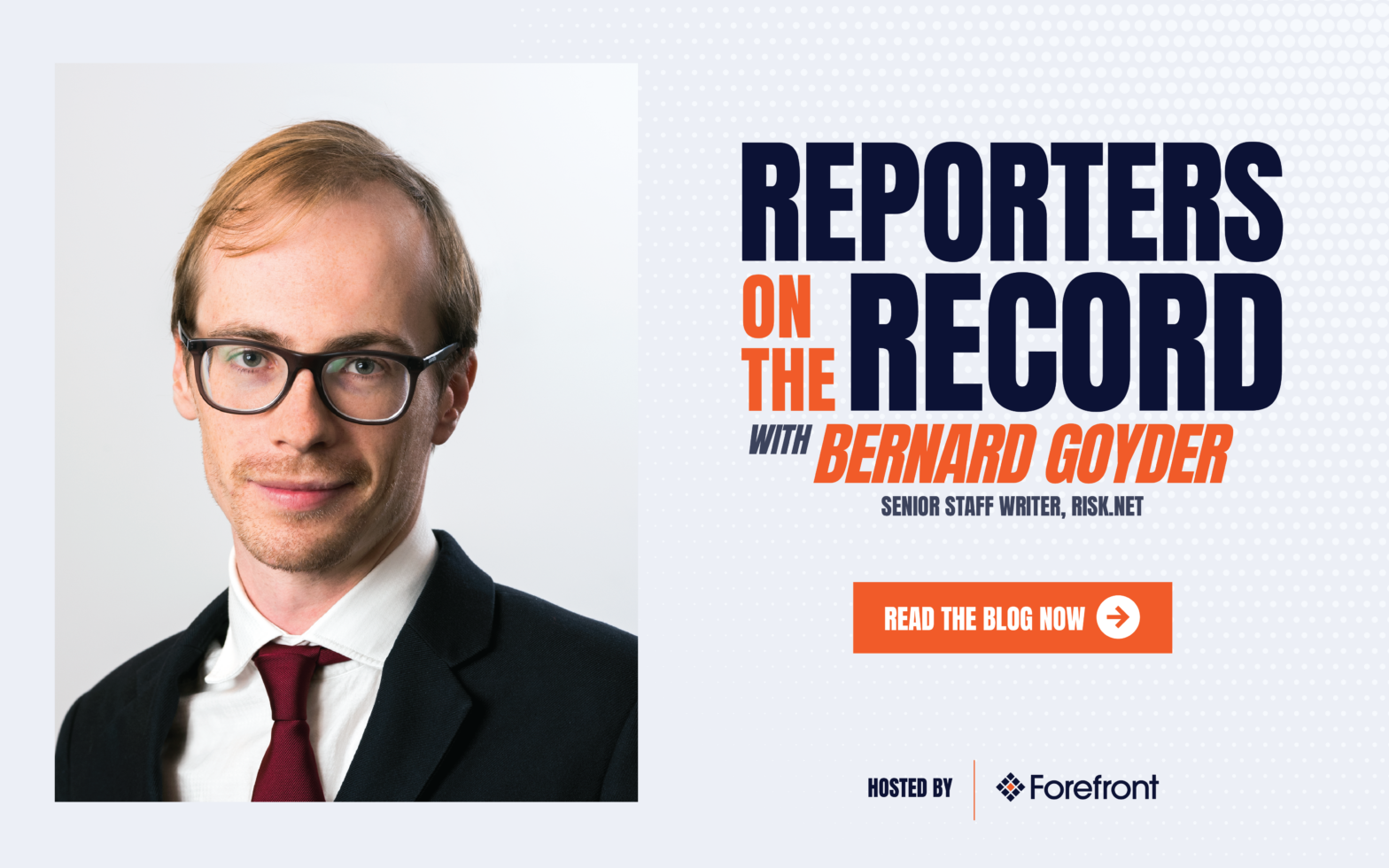In this edition of our Reporters on the Record series, we spoke with Bernard Goyder, Senior Staff Writer at Risk.net. In our conversation with Bernard, we learn about his journalism career path, the differences between working as a financial journalist in the US versus the UK, how PR practitioners can craft engaging pitches and more.
How did you get your start in journalism, and specifically financial journalism?
I got intrigued by finance and economics during the 2008 financial crisis. I started my career in journalism as an intern at a now-defunct banking magazine called Trade & Forfaiting Review, covering trade finance. I was doing a masters in financial journalism at City University in London at the time and seized an offer of a paid internship, as I couldn’t afford to do an unpaid one! I later freelanced for a few trade publications, covering banking, M&A and law, before landing a role at Dow Jones in 2015.
What do you love about your job?
Finance is about people. Everything that happens in finance has a personal story behind it, whether that’s an entrepreneur launching a startup or a trader making a bet. What I love most about my job is getting to speak to all these different people and hear their stories. I love gossiping with my sources to swap intel and stand up scoops.
You studied history as an undergraduate. Did you enjoy this field of study and how did you end up making the switch to studying financial journalism at the graduate level?
I still enjoy history, and I use the skills I gained from my degree every day. Journalism is just a different twist on the same core skillset of analyzing sources and crafting a credible, but ultimately subjective, narrative.
I finished my history degree in the teeth of a double-dip recession and didn’t really know what I wanted to do. I tried starting a business with a friend during the London Olympics, which was destined for failure but a great learning experience. I then worked in a call center selling ski vacations. I sold $400,000 worth of vacations before I was moved to their digital marketing team to write web copy. It was there I realized I could get paid to write, which led me to journalism.
You are based in the US but grew up in the UK. How did you end up moving to the US? Did you find the transition difficult?
I came to New York after nine years in London. I wanted a fresh start somewhere new, but where do you go next after London? Euromoney Institutional Investor, where I worked at the time, was growing its insurance publishing business in New York and I asked to be transferred. I’d only been to New York once before I moved here, so it was a gamble, but it worked out well.
The big professional difference between covering finance in the US and the UK is the sheer scale of the place. The unique geography of London’s financial center means everything is close together – they call it the Square Mile for a reason! People complain if they have to schlep over to Canary Wharf for a meeting. In the US, it’s much different. Forget the same city – your source might be in a different time zone.
The other huge challenge is how risk-averse much of corporate America is when it comes to talking to the press. Some PR firms in the US seem to view their job as protecting their clients from the media, rather than building mutually beneficial relationships with us.
In London, there is more of a culture of talking to financial journalists on the phone, even if it is a cold call. That is much harder in the US, especially in a post-COVID environment where no one picks up the phone and almost every call has to be scheduled in advance.
What is your advice to those looking to get started in journalism/financial journalism?
Try not to work for free, but be prepared to work for very little when you are starting out. Consider traveling abroad to get bylines: a friend of mine, Dan Ascher, got his start working in Bishkek, the capital of Kyrgyzstan, for an English-language paper, and he’s now at The Economist. I worked from India for six months when I was starting out, and once took a one-way flight to Serbia to cover the Syrian refugee crisis.
While many talented journalists do go straight from undergraduate into the industry, post-graduate courses are becoming a more common route. Alas, Ernest Hemingway’s experience of going straight from high school to the Kansas City Star is no longer the viable option it should be.
From your perspective, how can public relations (PR) practitioners best craft engaging pitches?
A good PR pro knows what the journalist they are pitching covers and tailors their pitch to that individual. Only a handful of the pitches I receive are relevant to my current beat of markets, trading and technology. Those are the ones that get a reply from me.
What do you like to do in your free time?
When I’m not writing about market structure, I’m a musician and singer-songwriter. I play violin and have played in bands. I’m an avid fan of Arsenal FC and enjoy playing retro video games like Age of Empires II.
